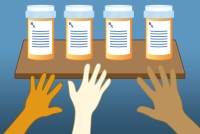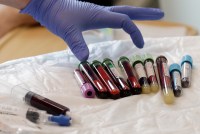Latest Morning Briefing Stories
Do Pharma’s Claims On Drug Prices Pass The Smell Test? We Found 5 Stinkers.
Drug companies are in the midst of a glossy publicity campaign to stop attempts to control rising pharma costs. But the devil is in the details.
Pocos se benefician con las nuevas drogas anti colesterol por el gran gasto de bolsillo
Una nueva generación de drogas podría ayudar a millones a bajar los niveles de colesterol malo. Pero el proceso para lograr una receta y el alto costo para el paciente están limitando su uso.
Absent Federal Action, States Take The Lead On Curbing Drug Costs
Congress has yet to take substantive action on this growing consumer concern, but a number of states are flexing their cost-control muscle.
Out-Of-Pocket Costs Often Keep Pricey New Cholesterol Drugs Out Of Reach, Study Finds
Research published this week by JAMA Cardiology analyzed pharmacy claims data related to a new class of cholesterol-lowering drugs.
Right After Trump Blamed High Drug Prices On Campaign Cash, Drugmakers Gave More
At a political rally in March, President Donald Trump said drug prices are “outrageous” and blamed campaign contributions. Drugmakers funneled nearly $280,000 to Congress the very next day.
Everyone Says We Must Control Exorbitant Drug Prices. So, Why Don’t We?
Any momentum to address prescription drug costs has been lost amid rancorous debates over replacing Obamacare and stalled by roadblocks erected via lobbying and industry cash.
Without Price Breaks, Rural Hospitals Struggle To Stock Costly, Lifesaving Drugs
A federal drug program blocks rural hospitals from getting discounts on rare-disease drugs, forcing staff to cut back on supplies of lifesaving medicines.
FDA Moves To Guard Against Abuse Of ‘Orphan Drug’ Program
Following a KHN investigation, the Food and Drug Administration has moved to speed up approvals of “orphan drugs” while closing a loophole that allowed drugmakers to skip pediatric testing.
Cuestionan la necesidad de una vacuna contra la meningitis B para universitarios
Expertos dicen que farmacéuticas están apelando al miedo de los padres para promover dos vacunas contra le meningitis B entre estudiantes universitarios, luego de dos brotes en campus.
Meningitis B Vaccine’s High Price Poses A Health Care Conundrum For College-Bound
This immunization may mark a shift among some vaccine makers to higher-priced, “niche” preventives that protect against very specific and sometimes rare illnesses.
St. Kitts Launches Probe Of Herpes Vaccine Tests On U.S. Patients
After a Kaiser Health News report on an offshore herpes vaccine trial that skirted FDA regulations, St. Kitts and Nevis officials claim they had no knowledge of the testing. An investigation is underway.
Pioneering Cancer Gene Therapy Gets Green Light — And $475,000 Price Tag
The USA’s first approved gene therapy — to be used to fight leukemia that resists standard therapies — will cost $475,000 for a one-time treatment.
Facebook Live: The Prescription Drug Pricing Pipeline
In this Facebook Live, KHN’s Julie Appleby talks with Stephanie Stapleton and answers readers’ questions about the prescription drug pricing pipeline and the industry stakeholders who have a role in what you pay.
Polémica por ensayo de una vacuna contra el herpes en el extranjero
El ensayo clínico de una vacuna contra el herpes común fuera de los Estados Unidos ha generado una controversia médica y una investigación gubernamental.
Offshore Human Testing Of Herpes Vaccine Stokes Debate Over U.S. Safety Rules
Prominent businessmen and an American university supported offshore testing of an experimental vaccine.
Nueva droga contra la leucemia ofrece esperanza, pero a un costo millonario
El tratamiento con una nueva droga del laboratorio Novartis para casos en los que ha fracasado la quimioterapia o el trasplante de médula costaría $649,000.
‘Breakthrough’ Leukemia Drug Also Portends ‘Quantum Leap’ In Cost
A genetically altered cancer drug, based on CAR T-cell therapies, could be a big success with leukemia patients but at a staggering cost.
Dying At Home In An Opioid Crisis: Hospices Grapple With Stolen Meds
As more patients receive hospice care at home, some of the powerful, addictive drugs they’re prescribed are ending up in the wrong hands.
Climbing Cost Of Decades-Old Drugs Threatens To Break Medicaid Bank
Medicaid spent billions more in 2016 than the year before on decades-old prescription drugs, including many generics, a Kaiser Health News data analysis shows.
Hospitals Slashed Use Of Two Heart Drugs After Huge Price Hikes
Hospital use of two popular heart medicines, nitroprusside and isoproterenol, dramatically dropped after the prices for both soared.





















